- Home
- John Bellairs
The Treasure of Alpheus Winterborn Page 2
The Treasure of Alpheus Winterborn Read online
Page 2
Anthony was mystified. The only pages he’d ever heard of, aside from the pages in a book, were the little boys in fairy tales who came in and blew horns and announced things. They wore funny-looking costumes and had shoes with long, pointed toes. Anthony wondered if that was the sort of thing Miss Eells had in mind.
Miss Eells smiled. She could tell that Anthony didn’t have the faintest idea of what a library page was. She had just opened her mouth to tell him when the kettle started making about-to-boil noises. It trembled and rattled and whined, and little wisps of steam came curling out of the spout. Miss Eells got up and opened the cupboard again. She took out a big brown teapot with a gold band around it, and a yellow box of Lapsang Souchong tea. Then she took the kettle off the hot plate and poured a little of the boiling water into the teapot. She swirled it around and dumped it into a potted geranium in the corner. The geranium was dying, and the hot water wasn’t going to help it much. As Miss Eells struggled to get the lid off the tea box, she broke a fingernail, but finally she managed to pry it off. Three spoonfuls went into the pot, and in went the boiling water. They waited for the tea to steep; then Anthony held the strainer as Miss Eells poured it out. It smelled smoky and tasted strange, but Anthony didn’t mind. He just liked the idea of having tea with Miss Eells. It was a warm, friendly thing to do.
“Now, then,” said Miss Eells as she sipped her tea, “where were we? Oh, yes. A library page has all sorts of duties. He has to take books that have been returned to the library and put them back in their proper places. You’ll have to know something about the Dewey decimal system, but that’s easy enough to learn. Then you’ll have to get books for people, and—”
Anthony looked puzzled. “How come they can’t go get them themselves?”
Miss Eells grinned and cocked her head to one side. “Anthony, I know this is hard for you to understand, but most people who come into a library don’t have the faintest idea of how to find a book. They don’t know how to use the card catalog, and they think the Dewey decimal system is something kids learn in arithmetic class. That’s where you come in. You look up the book for them and bring it out to the circulation desk. If you happen to be tending the desk at the time, you stamp the book out for them. Some things, like the back issues of magazines, are kept in a locked room in the basement. If someone wanted one, you would have to go downstairs and get it for them. Then there are all sorts of general tasks, like lighting the fire in the West Reading Room fireplace in the wintertime, and tidying and dusting and things of that sort. Which brings me to something that I feel I have to tell you. If you take the job, you start tomorrow, and tomorrow is the twenty-first of March. Do you know what the twenty-first of March is?”
“Groundhog Day?”
Miss Eells glared at Anthony over the top of her glasses. “Groundhog Day indeed! Go to the foot of the class, as my late father used to say. It’s the vernal equinox, the first day of spring! It is also the day when I start the spring cleaning of the library. Do you think you’re ready for that?”
“Gee, I dunno. What do I have to do?”
“Oh, not much. You just have to help me polish the woodwork and clean the floors and dust the bric-a-brac and clean the windows and...” Miss Eells stopped talking and burst out laughing when she saw the horrified expression on Anthony’s face. “Oh, Anthony, come on! I’m just kidding! I will have a few extra chores for you to do, but I’m not Simon Legree. You can do what you feel like doing. How about it? Are you interested in the job?”
Anthony grinned and stuck out his hand. “Put ‘er there, Miss Eells!” he said.
Miss Eells stuck out her hand, too, and as she did so, she knocked over her cup of tea.
CHAPTER 2
Hoosac, Minnesota, was on the Mississippi River. It was a long, skinny town, shaped like a cigar, with the Mississippi on one side and a long artificial lake called Lake Hoosac on the other. All around the town the land was as flat as a tabletop, but in the distance, on either side, rose tall bluffs. The bluffs were very tall, six or seven hundred feet high, and they were covered with trees. The bluffs on the western side of the town were a long way away, but the ones on the eastern side were quite close. They seemed to tower over the town: Anthony could see them from his bedroom window. Sometimes before he went to bed, he sat in the window and stared at them as they lay shrouded in darkness or glimmering in the moonlight.
It was funny to think that those bluffs were in Wisconsin. Watching them from his window, Anthony was in Minnesota. The river was the boundary, and it was other things, too—a sort of liquid highway for all sorts of barges and boats. The river traffic was not as important to the town as it had been in the steamboat days that Mark Twain wrote about, but it still went on. Often during the night, Anthony could hear the horns of the barges hooting. The sound echoed in the hollow iron holds of the vessels. It was a lonely sound, but somehow nice to listen to as you lay in bed at night. Anthony thought that Hoosac was a nice place to live.
When Anthony sat down at the dinner table with his family that evening, he was bursting with good news. His face showed it, and when his mother passed him the peas, she said suspiciously, “Well! What have you been up to, hmmm?”
“I’ve got a job, Ma!” said Anthony excitedly.
His mother stared at him blankly. “A job? Doing what?”
“I’m gonna be a page down at the library. Miss Eells got me the job!”
Mrs. Monday’s eyes narrowed. She didn’t like Miss Eells much because she was jealous of her. Mrs. Monday often behaved as if she didn’t like Anthony, either, but in her strange way she was greatly attached to him, and she resented the idea that somebody else might try to be a mother to him.
“She wants you to work for nothing, I’ll bet!” replied Mrs. Monday.
Anthony winced. Then he got angry. “No, she doesn’t, Ma!” he shouted. “She’s gonna give me a dollar an hour! Whaddaya think of that, huh?”
“Mom can hear you, Tony,” said Keith, glancing nervously at his mother. “You don’t have to yell.”
“I don’t care! She always thinks that Miss Eells is a kook or a crook, and she isn’t. She isn’t, she isn’t!” Anthony screamed these last words at the top of his voice.
Mrs. Monday laid down her knife and fork and glared grimly at Anthony. Her voice trembled as she spoke. “Anthony Monday, if you cannot control yourself any better than that, you had better leave the table. Go up to your room at once!”
Anthony got up, shoved his chair back into its place, and walked out of the room. He went upstairs, sat down at his desk, and cried.
Later, when everybody else had finished eating, Anthony came down and ate his cold food. Then he decided that he would go out to the garage to see what his brother was up to. On his way out, he passed through the kitchen, where his mother was washing dishes.
“I’ll bet she never pays you,” Mrs. Monday said without turning around. Anthony said nothing. He clattered down the back steps and went out to the garage.
Anthony’s older brother, Keith, was nuts about cars. When he was little, he used to play endlessly with cars and trucks, and he had really never grown out of it. The side yard of the Mondays’ house was strewn with rusting radiators, dented fenders, and other car parts. At present, Keith was working on the family car. The hood was open, and from the ceiling of the garage hung a spotlight on a long cord. Keith was dressed in gray coveralls, and his hands and face were streaked with grease. Wrenches and rags lay draped on the fender. When he heard the side door of the garage open, he looked up and smiled. “Hi, kid! Hey, don’t listen to the things that Mom says. She doesn’t always know what she’s talkin’ about! I think it’s great that you got a job. When I was your age, I couldn’t even get a job as a crummy paper boy. Congratulations!”
Anthony beamed. He liked his brother a lot, and at times like this, he liked him more than he could say. Anthony hung around the garage for an hour, just watching Keith work and talking to him. Then he went in to do his homework. He f
elt a lot better.
The next day after school, Anthony started his new job. It turned out to be a lot of fun. He liked poking around in the stacks, climbing up on ladders, and fetching down books for people. He felt important when he sat at the main desk and looked around at all the people who were sitting and reading in armchairs or at tables. He even enjoyed answering the weird questions that people asked him over the phone, like “Who were the first three governors of Minnesota?” or “Could you find out for me the real name of the Minnesota novelist Frederick Manfred?” or “Where is the nearest state where you can get married without a blood test?”
Needless to say, Anthony couldn’t answer any of these questions off the top of his head. What he did was write them down and take them to Miss Eells, who would then tell him where to look up the answers. (In the case of the blood test, she suggested that Anthony say he didn’t know and hang up politely.) In a little while, Anthony got so good at the question-answering game that he could go directly from the phone to the right reference book without having to ask Miss Eells anything.
When he was off duty, or when there was nobody in the library but Miss Eells and him, Anthony would explore. It was a big old building, and only about half of it was really needed, or used, by the library. On the second floor was a little museum run by the Hoosac Historical Society. It was hardly ever open, but since Anthony had the keys to all the rooms and display cases when he was on duty, he would sometimes pop into the museum and try on Civil War helmets or play with the antique pistols and swords that were exhibited there. He was always very careful to put everything back where he had found it when he was through fooling around.
There were other rooms, too. Some were small and spooky. There was a little auditorium where lectures and slide shows were sometimes put on. There was a smoking room, equipped with easy chairs and ash trays for those who wanted to smoke while they were visiting the library. There was the Alpheus Winterborn Reading Room, a comfy little parlor full of sofas and overstuffed chairs. In this room were glass cases containing models of the perpetual-motion machines that Mr. Winterborn had tried to invent, and in the bookcases that lined the walls were all the books that had been in Alpheus Winterborn’s personal library. Some were books on archeology, such as Interesting Tombs of the XIX Dynasty or Monuments of the Fayyum. Some had to do with architecture, like the works of Vitruvius and Palladio. And of course there was Mr. Winterborn’s long and boring account, written out in longhand, of his archeological career.
At one end of the room was a marble fireplace, and over it was a portrait of Alpheus Winterborn in a heavy gilt frame. It showed him as he had been when he was young, in the 1870s, when beards were in fashion. Anthony thought he looked like one of the Smith Brothers on the cough-drop package. He often found himself staring at this portrait. The expression on the man’s face interested him. Maybe it was just Anthony’s imagination, but it seemed to him that Mr. Winterborn was amused. It was as if he were enjoying some wonderful secret joke, and Anthony couldn’t help wondering what it was.
Weeks and months passed. June came, and school let out. Miss Eells asked Anthony if he wanted to keep on working at the library during the summer. He said sure. He was even willing to work longer hours than before. Most of his friends had summer jobs, and Anthony really liked being at the library more than he liked being at home. If he sat around at home doing nothing, his mother found something for him to do, or else she made him feel so guilty that it wasn’t any fun sitting around. And of course he liked the money he was being paid. Every Friday he got a little brown envelope with his wages in it. He spent some of the money on movies and popcorn and comic books and things of that sort. The rest he put in the bank. One day Anthony went down to the First National Bank of Hoosac with his father and proudly opened up his own personal savings account. It made him feel good to have a savings account like the one his parents had. He felt that somehow he was contributing more to the family than he had been before. The bankbook made him feel that he was really worth something.
The rest of June passed, and July began with a heat wave. The temperature rose to one hundred and stayed there. Everything was sticky or hot to touch. The pavement burned under the soles of your feet as you walked along, and it took great effort just to move.
On one of these broiling hot days—a Wednesday it was—Anthony was in the West Reading Room, changing the magazines in the magazine rack. All the windows were open, and the curtains on the long windows hung limp. In the corner, a girl in shorts was reading a copy of Seventeen, and an old lady was browsing along one shelf. A fly buzzed past Anthony and sailed up toward the ceiling. As Anthony followed it with his eye, he happened to glance at the carvings over the fireplace. He had noticed them before because they were so strange-looking.
There was a wide, square panel covered with three- dimensional carved objects that stood far out from the wall. There were oranges and lemons and sheaves of grain and bunches of grapes and clambering monkeys and, here and there, odd little faces peeping out through the carved shrubbery. At the top of the panel was a pointed cornice; on the point was a half-moon just like the stone half-moon and banner over the front door. On the banner was the same motto: BELIEVE ONLY HALF OF WHAT YOU READ.
As Anthony stood looking up at this wilderness of carved wood, it occurred to him that the panel needed dusting. Big cobwebs festooned the monkeys and grapes and grain, and gray dust lay thick in all the crevices.
Anthony suddenly felt like giving that panel a good, hard dusting. It was a hot day, and his clothes were soaked with sweat, but he didn’t care. He felt energetic, and besides, it would be a nice thing to do for Miss Eells. Down to the basement he went. He got out the step-ladder and the feather duster from the broom closet. Back upstairs, he set up the shaky ladder in front of the fireplace. With the duster in his hand, he climbed to the top and then stepped off onto the marble mantel. He started to dust, whisking the feather broom back and forth over the carvings. It was a tall panel, and in order to reach the top, he had to stand on tiptoe. Whisk, whisk! Cobwebs flew in all directions. If only he could reach the top of that silly half-moon and knock off the cobweb that was trailing from one of its horns. Anthony lunged with the duster, and then something happened. There was a sharp crack, like a pistol shot. The half-moon flew off the cornice, whizzed across the room, and landed in a corner.
Anthony’s face turned red. He didn’t dare look at the people who were in the library. Slowly, carefully, he set the duster down on the mantel and clambered down from his perch. With his head down, he walked quickly across the floor and knelt to pick up the ornament. To his very great surprise, he saw that it had broken in two. One moon face lay staring up, and the other lay propped against a chair leg. Inside the piece that was standing up, Anthony could see something glittering. It looked like a gold coin. And between the two pieces of wood, on the floor, lay a tightly rolled piece of paper.
CHAPTER 3
Anthony knelt there, lost in wonder. The wooden moon had been like a fortune cookie, with a message inside. But what was the message? The paper lay before him. All he had to do was unroll it and read. But Anthony was a cautious sort. If the paper turned out to be anything important—a treasure map, for instance—he wanted to examine it in private. And if that really was a gold coin there... well, he’d better scoop it up quick before somebody else decided that it was theirs.
With trembling fingers, Anthony gathered up the two wooden fragments and the piece of paper. He glanced nervously around and then made a dash for the door. In the hall, he almost ran into Miss Eells, who had a big paper bag in her hand.
“Watch out, Anthony,” she said, laughing, “or you’ll knock over the chocolate malt I brought you! Good grief! What do you have there?”
“It’s—it’s... I had an accident,” Anthony stammered. “Can we go to your office f-for a minute?”
Miss Eells gave Anthony a wondering look. “Sure. Of course. It’s snack time, anyway. Come on.”
Anthony
followed Miss Eells to her office. As soon as they were inside, he dumped the pieces of the ornament and the paper on her desk. Then he rushed to the door, closed it, and turned the key in the lock.
Miss Eells watched him in amazement. She glanced at the things on her desk. “Great Godfrey! Anthony, what are you up to? I shouldn’t have taught you that Civil War spy code. It’s gone to your head.”
“I’m sorry, Miss Eells. I know it looks dumb, but I found something inside a piece of wood that I knocked off of the top of the fireplace.” Anthony stopped talking when he saw the way Miss Eells was looking at him. Suddenly he was seized by the fear that he had damaged something valuable. Would Miss Eells get made at him because he had smashed the little wooden moon? “It—it was an accident,” Anthony stammered, pointing to the wooden fragments on the desk. “I’m sorry, I really am, I was dusting and... I’m clumsy, I know I am...”
“Anthony, Anthony, you idiot! Did you think I would be mad at you for something like that? Good lord, you know how clumsy I am. Did you really think I would fire you for such a thing? Now, what’s all this?”
“I don’t know,” said Anthony. “The little wooden doojiggy came apart when I knocked it down, and these things were inside it.”
Miss Eells’s eyes opened wide. “Were they now? Well, just sit down and make yourself homely, as my father used to say, and we’ll see what’s what.”
Miss Eells sat down behind her desk. Anthony pulled up a chair. He watched with growing excitement and curiosity as she turned over the two wooden fragments. She shook the piece that had the coin in it, but the coin was wedged tight. Miss Eells reached into her desk drawer and took out a penknife. She pried at the coin, and it came clattering out onto her desk top. She picked it up and examined it.

 The Curse of the Blue Figurine
The Curse of the Blue Figurine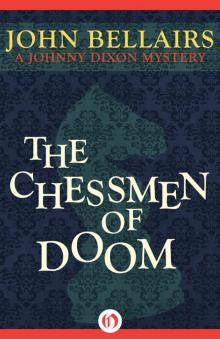 Chessmen of Doom
Chessmen of Doom Secret of the Underground Room
Secret of the Underground Room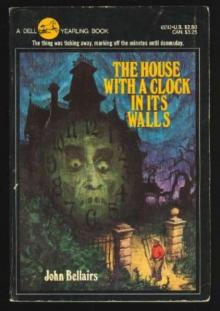 The House With a Clock in Its Walls
The House With a Clock in Its Walls The Vengeance of the Witch-Finder
The Vengeance of the Witch-Finder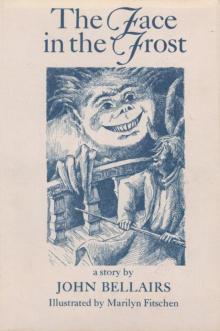 The Face in the Frost
The Face in the Frost Revenge of the Wizard's Ghost
Revenge of the Wizard's Ghost Spell of the Sorcerer's Skull
Spell of the Sorcerer's Skull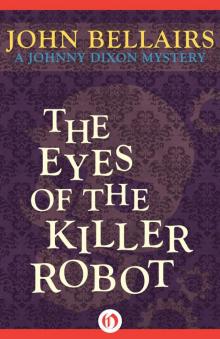 Eyes of the Killer Robot
Eyes of the Killer Robot Mummy, the Will, and the Crypt
Mummy, the Will, and the Crypt Wrath of the Grinning Ghost
Wrath of the Grinning Ghost The Mansion in the Mist
The Mansion in the Mist The Doom of the Haunted Opera
The Doom of the Haunted Opera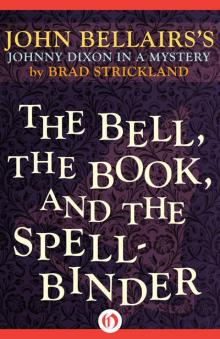 The Bell, the Book, and the Spellbinder
The Bell, the Book, and the Spellbinder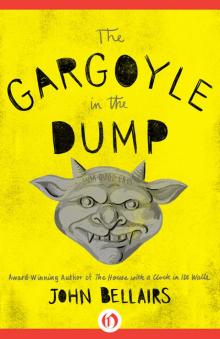 The Gargoyle in the Dump
The Gargoyle in the Dump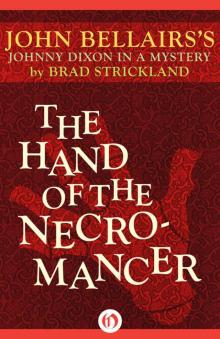 The Hand of the Necromancer
The Hand of the Necromancer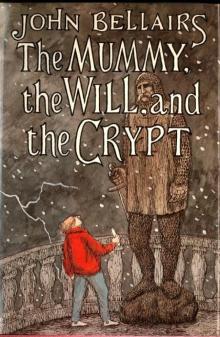 The Mummy, the Will, and the Crypt
The Mummy, the Will, and the Crypt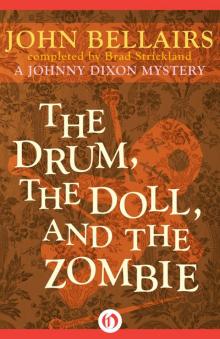 Drum, the Doll, and the Zombie
Drum, the Doll, and the Zombie The Specter from the Magician's Museum
The Specter from the Magician's Museum The Letter, the Witch, and the Ring
The Letter, the Witch, and the Ring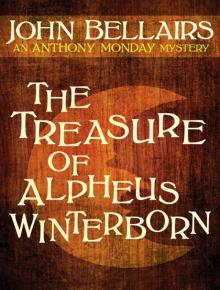 The Treasure of Alpheus Winterborn
The Treasure of Alpheus Winterborn The Dark Secret of Weatherend
The Dark Secret of Weatherend The Figure in the Shadows
The Figure in the Shadows